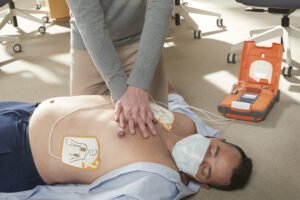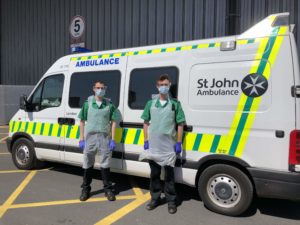The collapse of a Newcastle fan during a Premier League fixture in October was the latest incident which highlights the importance of a speedy and efficient response to cardiac arrest. Christian Eriksen’s sudden collapse at Euro 2020 was a “stark reminder that a cardiac arrest can strike anyone, anywhere and anytime, without warning,” according to British Heart Foundation’s Associate Medical Director.
 Danish footballer Christian Eriksen, 29, collapsed on the field during a Euro 2020 match between Denmark and Finland in Copenhagen, in June 2021.
Danish footballer Christian Eriksen, 29, collapsed on the field during a Euro 2020 match between Denmark and Finland in Copenhagen, in June 2021.
Following the incident, it was confirmed that the Inter Milan man suffered a cardiac arrest and had to be resuscitated on the pitch, before being transferred to hospital.
Eriksen returned to his club, Inter Milan, following his recovery. The Italian club described him as being in “excellent mental and physical shape”. The club says: “He will now follow the recovery programme put forward by Danish doctors in Copenhagen, who will also co-ordinate the clinical follow-up.
“The Inter medical staff will naturally be kept informed and up-to-date throughout the process.”
Referee Anthony Taylor, who has been widely praised for his speedy response to Eriksen’s collapse, told the BBC: “I could tell straight away. Christian was on his own. The only thing that was close to him was a bouncing ball which hit his knee. I was actually looking directly at him when he fell over. I could see his face as he fell. I knew straightaway something was wrong because of how his face looked and how he fell to the floor. That is what concerned me the most.”
Immediate CPR and defibrillation is vital
Dr Sonya Babu-Narayan, British Heart Foundation’s Associate Medical Director and Consultant Cardiologist, said: “This shocking event is a stark reminder that a cardiac arrest can strike anyone, anywhere and anytime, without warning.
“If someone suffers a cardiac arrest, it’s vital they receive immediate CPR and defibrillation to give them the best chance of survival. Thankfully it seems that this was the response that Christian received.
“Every second counts when someone suffers a cardiac arrest – the more of us that know how to perform CPR, the more lives that can be saved.
Taking safety seriously
According to British Heart Foundation, more than 30,000 people suffer out-of-hospital cardiac arrests every year in the UK and unfortunately only one in 10 people survive.
“By installing an Automated External Defibrillator (AED) at your workplace and training colleagues in both how to use it and how to perform CPR, your organisation can play a role in helping more people survive a cardiac arrest.
“You’ll also demonstrate that your business takes people’s safety seriously. Having a defibrillator on your premises is a relatively small investment that could one day save someone’s life. A cardiac arrest can affect anyone at any time – whether you’re at home, work or out in public places.”
Accessible to all
The English Football Association has commented to say that all England players are screened for possible heart conditions on a regular basis, to avoid a situation similar to Eriksen from happening.
The FA said that every England player undergoes an echocardiogram, which involves an ultrasound scan of the heart, every two years.
Astley Mulholland leads a campaign to have defibrillators in all football grounds, having lost his bother to a cardiac arrest during a match in 2005.
Former Bolton Wanderers midfielder Fabrice Muamba, who collapsed when his heart stopped during a Premier League match in 2012, told the BBC that defibrillators should be accessible to all and people should know how to use them.
“Defibrillators should be like fire extinguishers, accessible to everyone in every building.”
Medics spent six minutes trying to resuscitate Muamba. He has since recovered but retired from professional football in the months following his collapse.
In October 2021, a Premier League match between Tottenham and Newcastle was halted for over 20 minutes after players and officials were alerted to the fact that a Newcastle fan had collapsed in the stands and required CPR.
A number of supporter quickly assisted the casualty, before paramedics and medical staff from both clubs were able to assist. In a statement, Newcastle confirmed the supporter’s condition and added: “The club would like to thank fans for their swift actions in raising the alarm and praise those who provided immediate chest compressions, as well as thanking the on-site medical professionals who swiftly administered emergency treatment using a defibrillator located close to the incident.
“Newcastle United club doctor, Dr Paul Catterson, also attended the incident to offer additional support with an additional defibrillator.
“Our best wishes go to the supporter and their loved ones and we hope for a swift and full recovery.”
Click here to read more about defibrillators, why they are important and how to maintain them.
St John Ambulance reminds public about CPR training
 First aid and health charity St John Ambulance has reminded members of the public about its free CPR modules online and its face-to-face training courses, following a 565% increase in searches for CPR and defibrillator information in the light of the Eriksen incident.
First aid and health charity St John Ambulance has reminded members of the public about its free CPR modules online and its face-to-face training courses, following a 565% increase in searches for CPR and defibrillator information in the light of the Eriksen incident.
In addition to people seeking CPR information, the charity has seen a 1,900% increase in searches for defibrillator guides for first time buyers, and a 125% increase in searches for defibrillator accessories and training models, as the general public and organisations look to ensure lifesaving equipment is readily available.
Dr Lynn Thomas, Medical Director, St John Ambulance, said: “Our mission is First Aid Saves Lives and we strongly believe everyone should have vital first aid skills. We’ve seen an overwhelming and positive response from the public in the wake of this incident and want to pass on our praise to everyone for showing such an increased desire to educate themselves about how to deliver CPR and how to use a defibrillator.
“By reminding everyone of our free online CPR modules we hope we can give members of the public even greater confidence to be able to know what to do in an emergency. The administering of effective CPR combined with early use of a defibrillator in a cardiac arrest incident can have a dramatic effect on people’s chances of survival.”
How to carry out effective CPR
This demonstration from Zoll, shows how to use an Automated External Defibrillator to effectively carry out CPR…
Why should you subscribe to the SHP newsletter?
Do you want the very latest health and safety news, product launches, job listings and expert opinions sent straight to your inbox daily?
The SHP newsletter is essential reading – sign up today to get your hands on all this!

 Danish footballer Christian Eriksen, 29, collapsed on the field during a Euro 2020 match between Denmark and Finland in Copenhagen, in June 2021.
Danish footballer Christian Eriksen, 29, collapsed on the field during a Euro 2020 match between Denmark and Finland in Copenhagen, in June 2021. First aid and health charity
First aid and health charity 